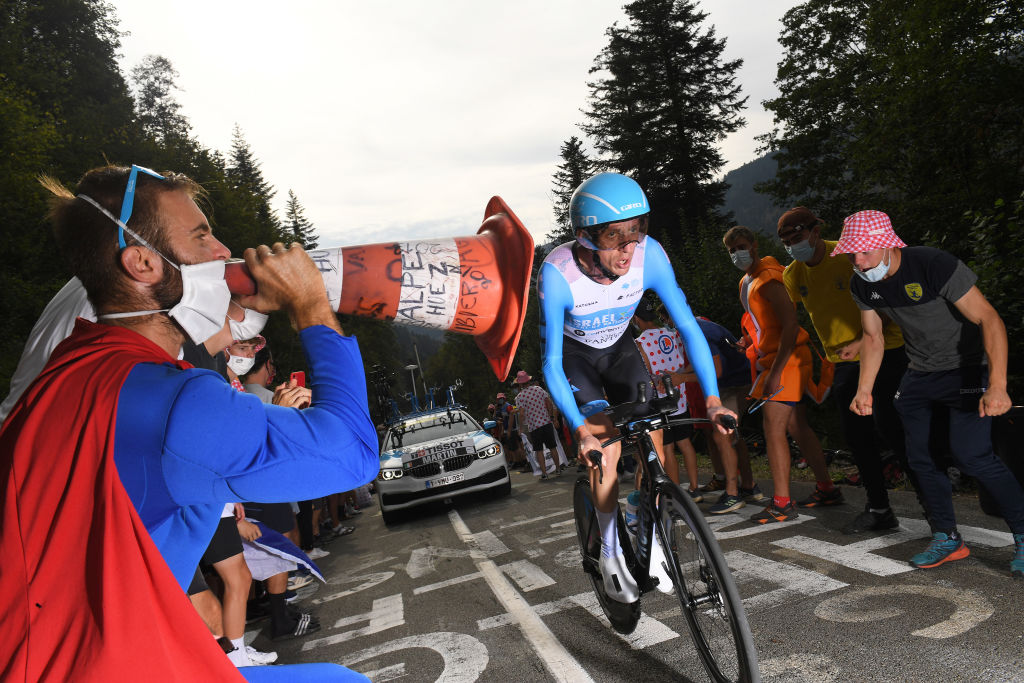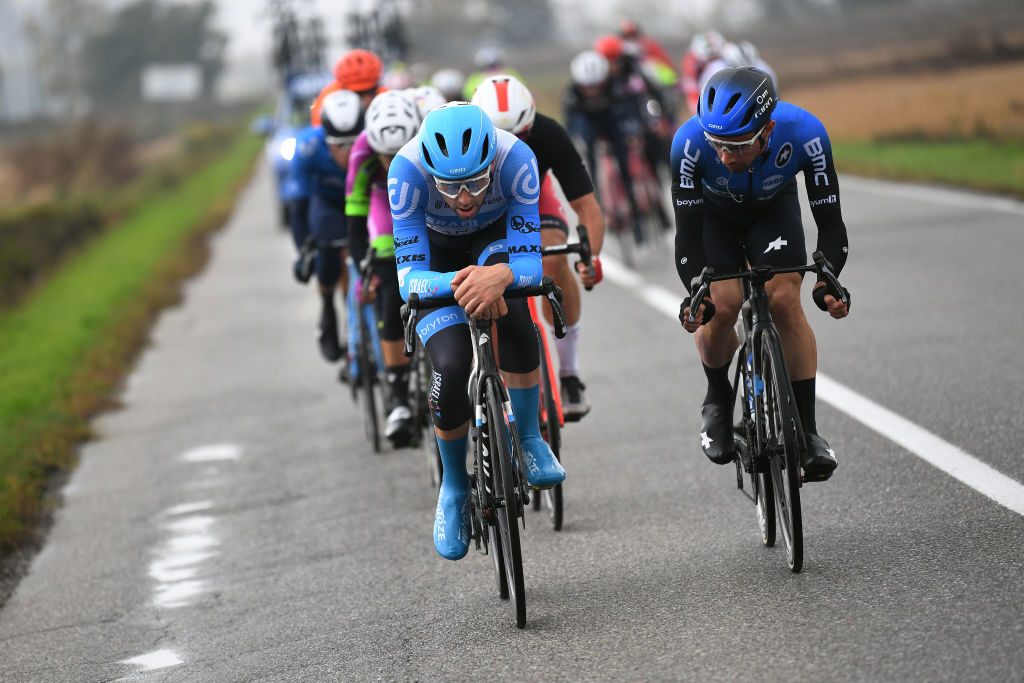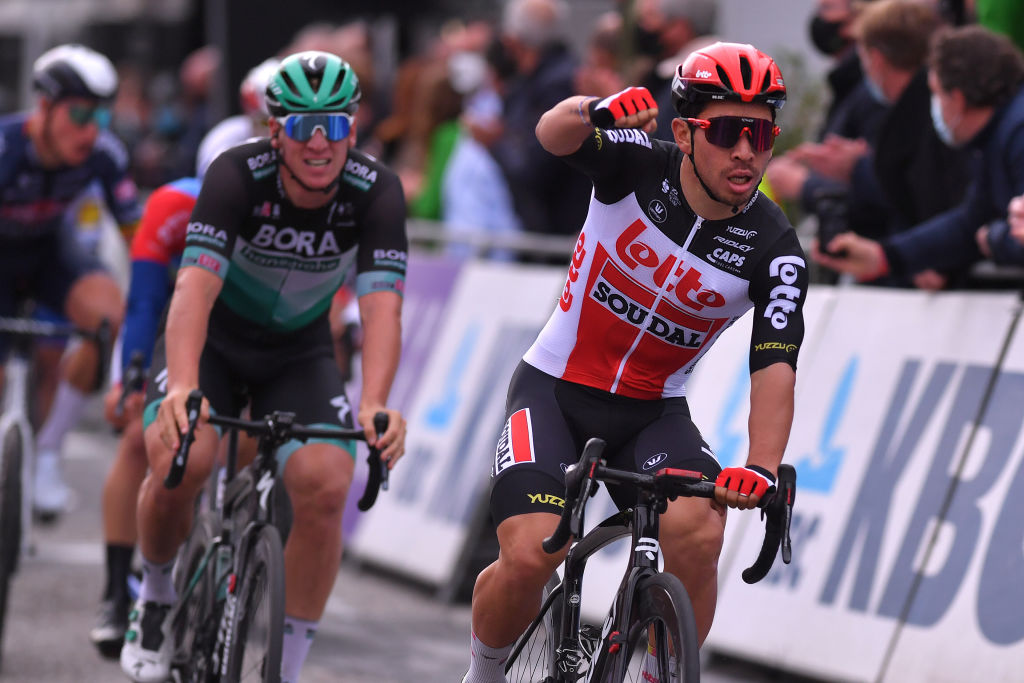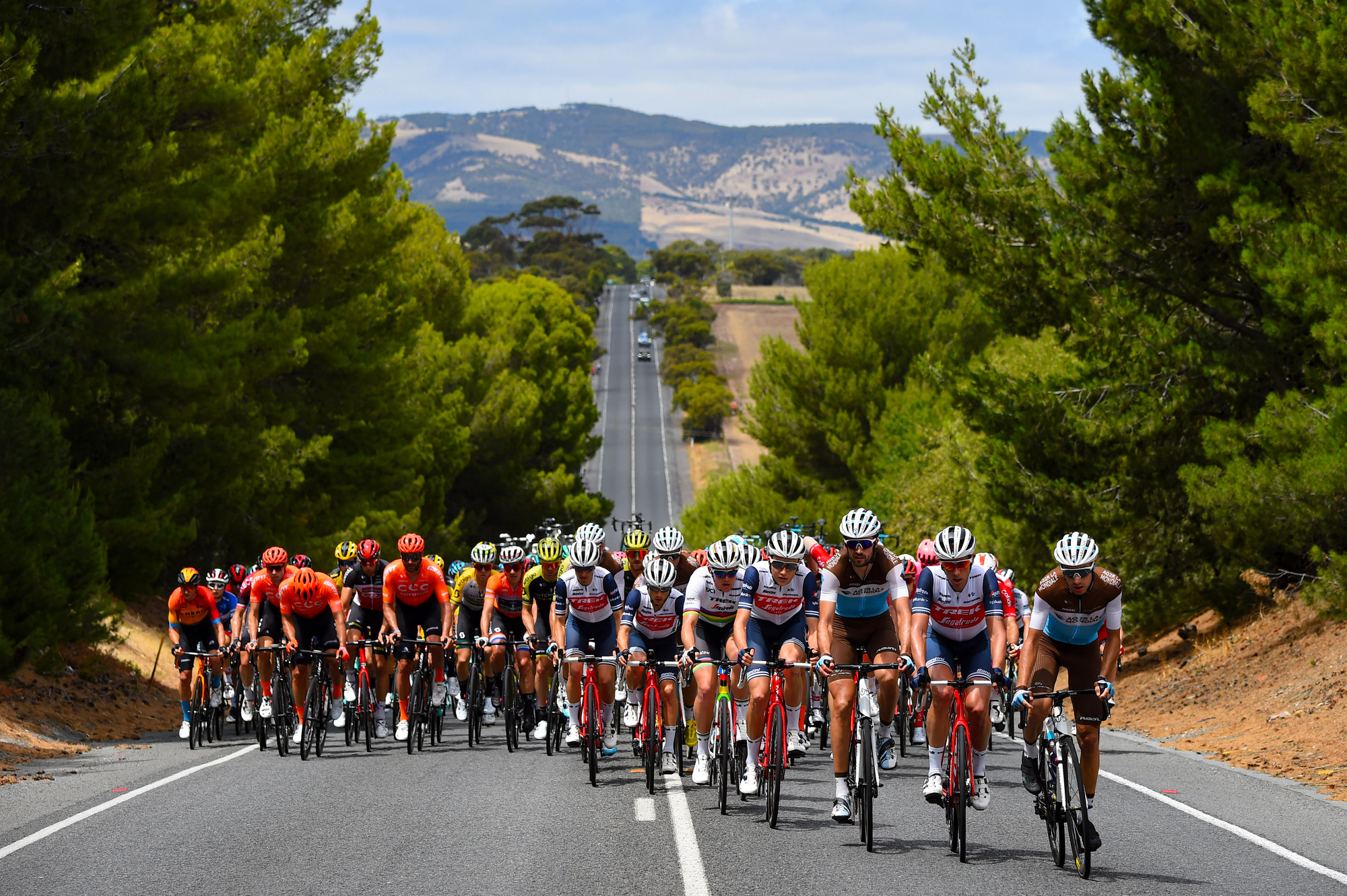Do riders care what you think? What they really make of social media criticism
Rising above the online noise with Dowsett, Ewan, Cromwell, Archbold and Haas

At the start of last year, Mark Cavendish gave an upfront interview to Het Nieuwsblad in which he stated that: "All that shit in your magazines or on Twitter, it doesn't hurt me."
For cycling publications, Cavendish represents a goldmine of quotes and headline material but this one, almost throw-away line, leads to two important questions – do riders care what the outside world really think of them, and secondly, does public opinion affect them?
Anyone who has actually interacted with Cavendish over the years will know that he reads a vast quantity of the content written about him, and does indeed care about his public persona, but not all riders are the same or have the profile Cavendish carries.
Some choose, perhaps wisely, to shield themselves from public scrutiny by rarely taking to social media, while others embrace platforms such as Instagram and Twitter as opportunities to speak directly to the cycling community and boost their profile. After all, riders with profiles can use their platforms to cut through the noise and either kill or ignite a story in just a few characters, while at the same time use what the media would describe as reach to promote certain brands or products.
Alex Dowsett has carved out a successful career in the WorldTour with two Giro d’Italila stage wins to his name and a raft of strong performances in national colours. However, the former UCI Hour Record Holder has seen how both praise and criticism can be directed towards an athlete and at the last edition of the UAE Tour he outlined how the media and fans can have negative effects on a rider.
“I do. I really do care. Everyone cares. We’re just in a day and age where everyone has a voice and everyone can speak directly to anyone they want. You need a much thicker skin than in days gone by,” Dowsett tells Cyclingnews.
“A couple of years ago when I’d had a run of mediocre results and wasn’t living up to peoples’ expectations, some folk thought I was a waste of a bike rider, and stuff. That’s tough to read. It’s a shame.”
The latest race content, interviews, features, reviews and expert buying guides, direct to your inbox!
Knowing that you’re performing below a certain level that you’re accustomed to is difficult enough to deal with without added pressure from fans and the media. The fact that a rider’s career and results are played out in front of a global audience only magnifies every mistake or lost second in a race. The issues can be compounded when athletes attempt to find solace online after a disappointing race only to find that they are the butt of someone’s joke on Twitter.
“We’re speaking about social media here, more than anything because most people don’t have the front to tell you what they think to your face,” Dowsett adds.
“Or even put their name to it, when you’re looking outside of your close friends and family. Social media in that respect can be a bad thing, especially when it’s an opinion based on what someone else thinks might be the truth.”
Dowsett raises a good point. There’s often far more to a result than just an athlete’s legs on any given day. Tactics, morale, and even equipment can all play their part, and if a rider’s poor results stem from sponsor-related issues, then it’s highly unlikely that the athlete in question will run such an excuse across social media. Not if they want to keep their job at least.
“You’re sat there, and you know you shouldn’t respond, but at the same time you know that person has no idea what they’re talking about. They don’t know the battles you’re having internally or the fact that you might be running crap equipment but just can’t say anything about it. It can be quite hurtful, and it makes it a shame for the people who support you vocally on social media, which is about 99 per cent. It’s the one per cent that makes you want to shut yourself off from the world.
“Does it affect me in terms of performance? Not from some of the nobodies on social media. When I say nobodies, I mean people that don’t put their names to things. So they are nobodies. But if it comes from people I respect, it can light a fire to prove everyone wrong.
"So if Rod Ellingworth was to say I was going like a sack of shit I’d be devastated. I don’t think he would, but he’s someone that I respect in that capacity. If it comes from someone with a load of letters and numbers in their Twitter name, then it’s different. You still read it though. People should be more accountable for what they say and have the balls to say it your face.”

Unlike Dowsett, pure sprinter Caleb Ewan has yet to taste the wrath of fans on social media. His WorldTour career has lit up since a move to Lotto Soudal two years ago and even when he was contentiously left out of Mitchelton-Scott’s Tour de France team in 2018, the Australian felt that he had the backing of the fans.
“To be honest, so far in my career I’ve had a lot of positivity on social media, even when I’m going badly,” Ewan tells Cyclingnews.
“Obviously, there are always some negative comments and when that happens you shouldn’t look at it too much but it’s okay as long as you can block that stuff out.”
When Ewan went to the Tour as a leader for the first time in 2019, and took time to settle in and begin winning, the pressure certainly started to mount on his shoulders, but the 26-year-old admits he was unaware of any criticism or questions fired in his direction, and that any form of negativity directed towards him had no effect on his confidence to perform.
“In the 2019 Tour, when it took me some time to get going, I thought it was quite positive, considering it was going so badly. It wasn’t until I got home to Australia and I was speaking to a friend who said that there was some shit about me and what some people were saying, but I didn’t see any of it. Of course, when you’re an athlete and things are going badly there will always be some people that have negative stuff to say but as an athlete, you know that you’re going to go through ups and downs.
“When I wasn’t selected for the Tour in 2018 it was a very split topic. There were a lot of people on my side and a lot of people on the side of Mitchelton when it came to leaving me at home. Maybe the bad stuff doesn’t come up in my feed but, like I said, there’s always some negative stuff. I’ve already seen someone write that I’m only starting well this year [2020 – ed.] because none of the other sprinters are on form yet. If you let that stuff get to you then it probably would affect you. It doesn’t really affect me. If I’m going badly, I know that there’s a reason for it. Usually, someone commenting on it doesn’t know the story.”
If Ewan comes across as relaxed towards the public’s opinions, then Shane Archbold takes things to another level. The New Zealander admits that he rarely uses social media and that if it weren’t for sponsor and team requirements, then he wouldn’t give Twitter, or another such platform, the time of day.
When asked if he cared what others thought of him, the lead-out rider flicked a mischievous smile towards his press officer before asking, “The general public or the other riders? It’s a no for both. I don’t care. I couldn’t care less.
“To be honest, I don’t read much, but occasionally I’ll hear things or read something but I’ve never taken the good or the bad. It’s amazing how many friends you have when you do something well and how many you have when times are tough. I don’t read into it too much but I do know that other riders do take effect from what’s said on social media. It can have a big effect on some but not me.”
Archbold doesn’t allow himself to fall down the rabbit hole of ‘likes’ and comment sections because often those taking him or his colleagues to task haven’t pedalled in his cleats or experienced what he has as an elite track rider or trusted lead-out for Sam Bennett.
“There are a lot of people sitting at home who haven’t ever seen a bike race live, let alone been amongst it,” he says without a hint of bitterness or anger.
“It’s also pretty rich to be critical of a race having watched it ten times over compared to being out there at 70kph and making the right decision at the right time. But if I had a choice then I probably wouldn’t be on social media. Teams encourage it, and I can see the importance of it for sponsors, but for me personally, I’d probably not going down that line too much other than having contact with friends and family.”
However, Archbold also admits that he’s seen first-hand that riders can be affected by what’s said about them across online forums, social media, and in the press.
“All I do is listen in the team meetings and tick the boxes off as I go but if you’re a leader or a climber and you’ve been bad in multiple races then for sure it takes a big effect on you,’’ says Archbold.

Nathan Haas has been a pro cyclist for over a decade and has ridden for some of the biggest WorldTour teams in the peloton. He may not have had the limelight thrust upon him like Ewan or Cavendish, but he understands that being a professional bike rider is about more than just results. Riders are not just representing their teams, they’re representing brands and marketing campaigns. For the Australian, it’s therefore vital for riders to have some form of connection to what the public is saying and thinking.
“If a rider can tell you in all honestly that they don’t care what people think then they’re truly a sociopath. It also might mean that they’re not really that professional because what people think of you is part of your job and what you get paid for,” he says.
“I’ve never met anyone in the sport who doesn’t find it hurtful when things are said about their personal life or those around them. I’ve been fortunate enough, and hopefully, this comment doesn’t troll, but when you see how some people comment on posts on websites it can start to get pretty messy and it makes you wonder why some people are participating. That’s always disappointing to see and I always feel for athletes.”
That brings to mind a former teammate of Haas, the American Tyler Farrar, who took a load of online criticism after a run of crashes in races.
“But he protected himself well,” Haas says. “He didn’t have a Facebook account or a Twitter account and he wasn’t on Instagram [he still isn’t – ed.] He’s a bit of a unicorn though but I was a teammate of his and the annoying thing was that in his last years he wasn’t even involved in a single crash, but people assumed it was him.
"I think he’s not the best example for the point we’re trying to make, because first, you need to define what confidence actually is, because that’s key to all this. Take Marcel Kittel for example. His racing persona was that of a machine, but his true personality was that he was much kinder, softer, and human. But having that position of the persona can go against what a person is really like over time and make them uncomfortable.”
According to Haas, however, negative comments from fans or the media don’t always translate into affecting a rider’s confidence.
“The only thing that’s real is your sense of self and your enjoyment for what you’re doing. When you’ve got good legs, everyone thinks you’ve got confidence but in reality, you’re just strong. You make things look easy and when you see guys making these fantastic decisions in the finales of racing it’s just because they’re going better than you. The ego in cycling doesn’t help you, and if anything it can hinder you because when it comes under threat, it can produce negative recovery, sleep problems, and questions over your sense of self.
“But when it comes to people commenting on family or personal things then it’s just total bullshit. That’s when those people need to have their own egos in check and start looking at themselves. That’s not what we’re going here. We’re here for sport and entertainment but we’re not in the public sphere to be on the cover of People magazine. We’re on Cyclingnews.”

Haas’ fellow Australian Tiffany Cromwell has been part of the women’s professional scene for over ten years. She has seen how the women’s peloton has improved over time and how the sport has grown in a number of aspects, despite huge challenges.
She believes that fans of women’s cycling can often be more supportive than those on the men’s side, although there are times when female riders face unfair criticism over their looks or appearance when their male counterparts are mainly held accountable over purely sporting criteria.
“Some of the riders I race have definitely been affected by it, while some have learned how to deal with it,” the Canyon-SRAM rider tells Cyclingnews.
“For sure it can have an affect though. When you’re praised it’s a good thing and it can give you more confidence, but when people are telling you that you’re shit and that you were a big deal and now you’re not performing then, of course, if you’re in a bad mental spot, it can definitely knock you over the edge.
“On social media, if the comments are on your personal appearance or if someone says that you’re fat then that can really affect a female rider probably more personally than it would a male rider. Those kind of judgments tend to be more targeted at female riders, although I don’t think it’s that common.
"I feel women can be more targeted for their looks, when men are more targeted by the trolls over doping or the performance side. I’ve never seen journalists go down that route, but on social media everything thinks that they can give their opinion. Image is more of a target when it comes women in sport.”
Certainly, women also face a degree of mansplaining from certain quarters when it comes their performances too.
“I’ve not had that but probably some of the key riders probably have, with the likes of Van Vleuten. The ones that are regularly winning the races probably do,” Cromwell says. “I feel like women’s cycling gets more support but there are still some of the old school out there that say our racing is less exciting or doesn’t deserve equal ranking because we’re women. The sport puts such a strong mental strain on riders so when you’re down in the dumps and you’re reading more negative stuff about yourself of course it’s going to make you feel more insecure.
“If you haven’t got a strong mentality and you read the media, or even the comments on the media, they can be pretty brutal. If a rider is in a bad place then it can affect performance, I would say so.”

The role of the media is vital to all of this as well. Whether people like it or not, the press have the power and the reach to shape the narrative of a story and they think entirely differently – or at least they should – to the riders, teams, and their press officers.
Riders have cared about what the press has written about them since the very first bike races and on a personal level, I’ve witnessed riders publicly berate journalists – myself included – for their headlines, copy, and social media activity.
At the same time, a small number of riders have been hesitant to give interviews in the past because of the comments or forum talk that would inevitably follow. A rider once told me that he was reluctant to do an interview because he was worried that his parents would read the inevitable comments on social media that would have likely followed, while some riders have even jumped into the comments section to argue against criticism.
Dowsett admits that on occasion he has turned down interviews because he has been hesitant over how a story might be interpreted and then translated into public opinion but adds that journalism comes with far greater levels of accountability.
“There are topics that I don’t want to talk about because you can’t win. Whatever you say, there will be a counter argument, or it will ignite a shit load of discussions at your expense and it’s not worth the hassle,” he says.
“The difference between criticism via journalism and criticism via social media is that in the latter there’s a lack of accountability. Criticism from journalists is more powerful because more often that’s what carves the opinions of social media trolls. When you see the comments you can sometimes see that people have gone straight from the headline to the comment section. There was a brilliant one where you guys had written that Van Aert had been parachuted into Omloop and then someone thought that he’s actually parachuted into the race and then expressed an opinion on it.”
Phoebe Haymes, who has worked for several high-profile teams as Head of Communications over the last few years, reiterated Dowsett’s stance.
“For every nine positive things that are said about him or her, the rider is always going to remember the one negative thing that’s been said. It’s human nature,” she tells Cyclingnews.
“Over time, as riders mature though they learn how to switch off a bit more. I think that Twitter is the worst because people say things on there that they’d never dream of saying to someone’s face. It can get quite personal.
“We used to tell riders not to post anything on social media one hour before or one hour after a race because it allows them to calm down but as soon as they’re on the bus they’re on their phones and can read exactly what has been said about them during a race.
“Every year we’d talk to riders about this at our pre-season camp but most of the time it comes down to common sense. Once you say something on social media it’s there forever, and that’s where you can get into trouble. It can be between riders as well, it’s not just about fans.”
Despite the drawbacks to social media, there are huge benefits for riders when it comes to its use. Some riders of course have partners or staff who manage their accounts in order to maximize their reach and influence while Dowsett, for instance, walks a somewhat thin line between wanting to engage but also needing to remain professional.
“Social media for a bike rider can be quite a valuable tool but there have been times when I just wanted to delete everything but it’s too valuable to give away. You’re stuck between a rock and a hard place,” he says.
“I generally respond when I can supply a response if I know my reply will tick two boxes: one it needs to make everyone else laugh, and secondly I have to make sure that I leave them with nothing to come back with. Or three, I’ll just correct their spelling or grammar. You have to appear to rise above it online but, Christ, it does get to you.”
Daniel Benson was the Editor in Chief at Cyclingnews.com between 2008 and 2022. Based in the UK, he joined the Cyclingnews team in 2008 as the site's first UK-based Managing Editor. In that time, he reported on over a dozen editions of the Tour de France, several World Championships, the Tour Down Under, Spring Classics, and the London 2012 Olympic Games. With the help of the excellent editorial team, he ran the coverage on Cyclingnews and has interviewed leading figures in the sport including UCI Presidents and Tour de France winners.
